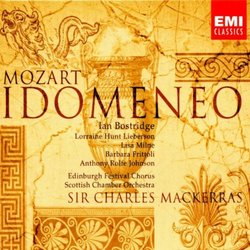A Very Full "Idomeneo" Beautifully Sung & Robustly Conducted
Nicholas A. Deutsch | New York, NY USA | 08/04/2002
(5 out of 5 stars)
""Idomeneo" has finally come into its own: over the past 50 years, performances & recordings (audio & video) have become more & more frequent. No wonder: this highly individual blend of Italian opera seria & French lyric tragedy is one of Mozart's most beautiful stage works, one which can prove an exciting & moving experience whether cast & played on a large or intimate scale. And Pavarotti & Domingo notwithstanding, its distinguished discography has been largely conductor-driven, featuring familiar Mozart names like Busch, Fricsay, Pritchard, Boehm, Schmidt-Isserstedt, Colin Davis, Levine, Harnoncourt and Gardiner.
Now add Sir Charles Mackerras to the list, with this vibrant new version. The orchestra is a successful blend of modern strings & woodwinds with "natural" brass (& I suspect 18th century timpani sticks); there's harpsichord continuo throughout, & some fairly discreet vocal ornamentation. The string section is of chamber size, which allows Mozart's ravishing wind writing to be heard in its full glory. Mackerras leads a robust, theatrically savvy performance, big on forward movement & not inclined to linger unduly, though not lacking in sensitivity: all vital musical & dramatic points are made. He uses an unusually full text, with abridgements -- almost entirely in the secco recitative -- limited to ones we know Mozart made or considered making; the ballet is in its proper place, right after the final chorus.
Ian Bostridge follows in a distinguished line of British lyric tenors who've sung the title role -- Richard Lewis, Peter Pears, Anthony Rolfe Johnson, Philip Langridge, tho' I don't think any of them sounded quite this youthful & light-voiced. Bostridge gives an impeccably sung & movingly acted performance, very introspective, & he sings his last aria, "Torna la pace," exquisitely. (Those who want more weight & brilliance will find plenty of German or Italian[ate] tenors to suit their tastes.) Lorraine Hunt Lieberson is a stylish & refined Idamante, who through her dignified delivery suggests the inner qualities that will make one day make this young man a good king; Lisa Milne is a well-schooled, unusually assertive Ilia; to my ears, her voice lacks some intangible spark of individuality, but she sings excellently & gives a dramatically complete portrait. And Barbara Frittoli brings a welcome glint of Italian metal to an otherwise rather "Northern" cast with her exciting Elettra. Anthony Rolfe Johnson, who sang a fine Idomeneo for Gardiner, is drier of tone these days but still a real presence as Arbace. An enthusiastic chorus & fine orchestra complete the picture.
About the sound: the solo voices are placed very definitely "in front of" the orchestra, & are closely miked. This allows us to hear every note & syllable very clearly; at the same time, I sometimes wished they were a bit further back in the mix, letting the instrumentalists have more presence. There is also little attempt at sonic "staging," for instance in the scene where Idomeneo & Idamante first meet. But overall this is a really worthy addition to the roster of "Idomeneo" recordings."
Beautiful!
Adele | Overland Park, Kansas. | 03/26/2004
(5 out of 5 stars)
"Being a big fan of Mozart opera, I thought that this was a wonderful opera set. The cast is amazing and the singers really know what they are doing. I do think that Bostridge's voice may have been a bit small for this role, but it's not bad and he sings well. Lorraine Hunt has a beautiful voice and shines on all her arias. Brava, brava, brava!"
Mackerras' triumph
Adele | 09/08/2002
(5 out of 5 stars)
"I have enjoyed Mackerras' Telarc Mozart opera recordings because of his imagination and brilliance. And sometimes despite less than perfect singing. But Mackerras' knowledge and insight always win through, unifying some very disparate elements in the cast. It's much the same story with this Idomeneo. The conductor is more dramatically pertient and better informed historically than even Harnoncourt and Gardiner. Alas, the central Idomeneo is sung by a young-sounding and colorless tenor. In no way does Ian Bostridge begin to suggest the complexity and stature of his role. The rest of the cast is well chosen, making his monotony of color and lack of ease with Italian seem more apparent. Is Idomeneo without the protagonist worth hearing? In this case, yes."


 Track Listings (26) - Disc #1
Track Listings (26) - Disc #1